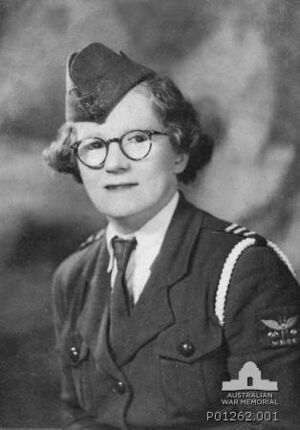Florence Violet McKenzie (nonfiction): Difference between revisions
No edit summary |
No edit summary |
||
| Line 14: | Line 14: | ||
<gallery> | <gallery> | ||
File:Henrietta Bolt.jpg|link=Henrietta Bolt|1942: Pilot and alleged time-traveller [[Henrietta Bolt]] works with Florence McMcKenzie on secret wartime communications protocol. | |||
</gallery> | </gallery> | ||
== Fiction cross-reference == | == Fiction cross-reference == | ||
* [[Henrietta Bolt]] | |||
== Nonfiction cross-reference == | == Nonfiction cross-reference == | ||
Revision as of 14:10, 9 July 2017
Florence Violet McKenzie OBE (née Granville; 28 September 1890 or 1892 – 23 May 1982), affectionately known as "Mrs Mac", was Australia's first female electrical engineer, founder of the Women's Emergency Signalling Corps (WESC) and lifelong promoter for technical education for women.
She campaigned successfully to have some of her female trainees accepted into the all-male Navy, thereby originating the Women's Royal Australian Naval Service (WRANS).
Some 12,000 servicemen passed through her signal instruction school in Sydney, acquiring skill in Morse code and visual signalling (flag semaphore and International Code of Signals).
She set up her own electrical contracting business in 1918, and apprenticed herself to it, in order to meet the requirements of the Diploma in Electrical Engineering at Sydney Technical College and in 1922 she was the first Australian woman to take out an amateur radio operator's license.
Through the 1920s and 1930s, her "Wireless Shop" in Sydney's Royal Arcade was renowned amongst Sydney radio experimenters and hobbyists. She founded The Wireless Weekly in 1922, established the Electrical Association for Women in 1934, and wrote the first "all-electric cookbook" in 1936.
She also corresponded with Albert Einstein in the postwar years.
In the News
1942: Pilot and alleged time-traveller Henrietta Bolt works with Florence McMcKenzie on secret wartime communications protocol.
Fiction cross-reference
Nonfiction cross-reference
External links:
- Florence Violet McKenzie @ Wikipedia
Attribution:


